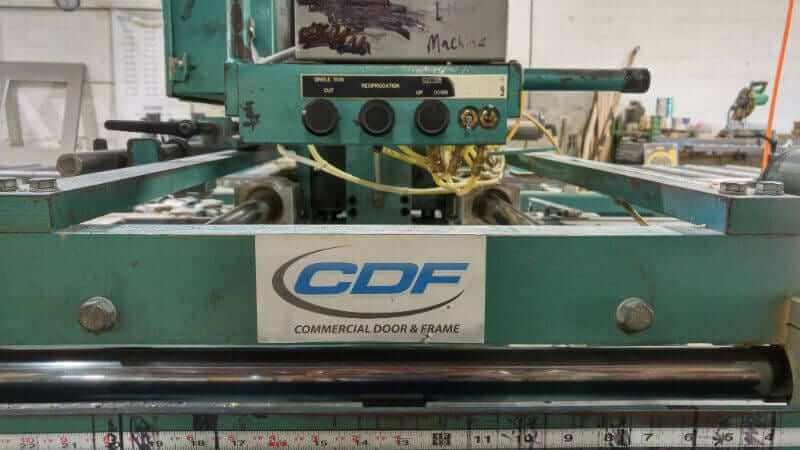
Since the 40's, technology has greatly improved how commercial hollow metal doors are made. The manufacturing process includes nine steps before a metal door is shipped out to be installed at a job site. First off, the process starts with the raw materials.
The standard material for a commercial metal door is galvanealed steel.
Galvanealed steel is a steel surface that's received a galvanized coating that has been annealed, which is a proccess of heating and allowing to cool slowly, to make it easy to paint.
Next the steel doors go through a process called Shearing. This process cuts the sheet metal to the specified size needed for manufacturing.
Next the steel door components are taken to a punch press. Once the material has been sheared it’s time to move on the Punch Press.
The CNC Punch Press has 56 different tools used to make precision cuts for openings needed for metal door hardware, light kits, louvers and other accessories.
After punching, the steel is taken to the forming press. This press is used to form the edges of the hollow metal doors by bending the steel along a hard edge. This process uses a machine called a Press Break. A 300 ton press break is used with 2 stage forming dyes within the forming press to make sure there are tight crisp edges to every door giving it a precise fit within a hollow metal door frame.
One of the most important parts of the metal door manufacturing process is called Spot welding. Spot Welding is used to attach hinge, closer and lock reinforcements within the body of the door, as well as securing any additional stiffeners.
After the steel shell is assembled, a core is then added to the door. The core is used not only to provide a more rigid door, but also allows for additional features such as energy efficient door insulation, bullet resistance and sound proofing. There are three types of door cores: Honey Comb core, the steel stiffened core, and finally the polystyrene core. The honeycomb core was popular before, but environmental concerns now make polystyrene core doors standard.
Polystyrene offers a quiet, light weight fill with excellent insulation properties and is easily used in conjunction with steel stiffeners and other sound proofing. Special, rated polystyrene is also commonly used in fire rated metal doors because of it's ability to withstand high temperatures and inhibit flame spread.
Finally, after all the components of the door are assembled, the metal door is then placed through a machine called an edge welder. This automatic welder merges both of the edges of the two door halves into one finished product.
The next step is to move the door into the finishing room. Workers grind weld edges smooth and sand imperfections for a finished look. The door is then inspected one last time for quality before being mounted to hangars and entering the painting booth.
Hollow metal doors are typically painted with a baked on grey water based primer finish. This low-VOC paint meets lead-free requirements and is ANSI Spec 25010 tested for prime paints. This primer finish allows customers to easily paint the door to any desired color after it is installed.
After finishing, the door is just about ready to be shipped off to the customer. The last thing done before shipping is to label the door.
Without a proper label, a hollow metal door, even if fire-rated, won't meet fire codes. The fire-rating label provides crucial details to installation crews, building owners, and codes inspectors about the door's materials and rating.
All of the doors manufactured by CDF meet a 3 hr fire rating, and always have proper labels!
Now the hollow metal door is complete! Time to carefully package the door, match it with the order, get it stacked on a pallet and it's ready to be shipped off.